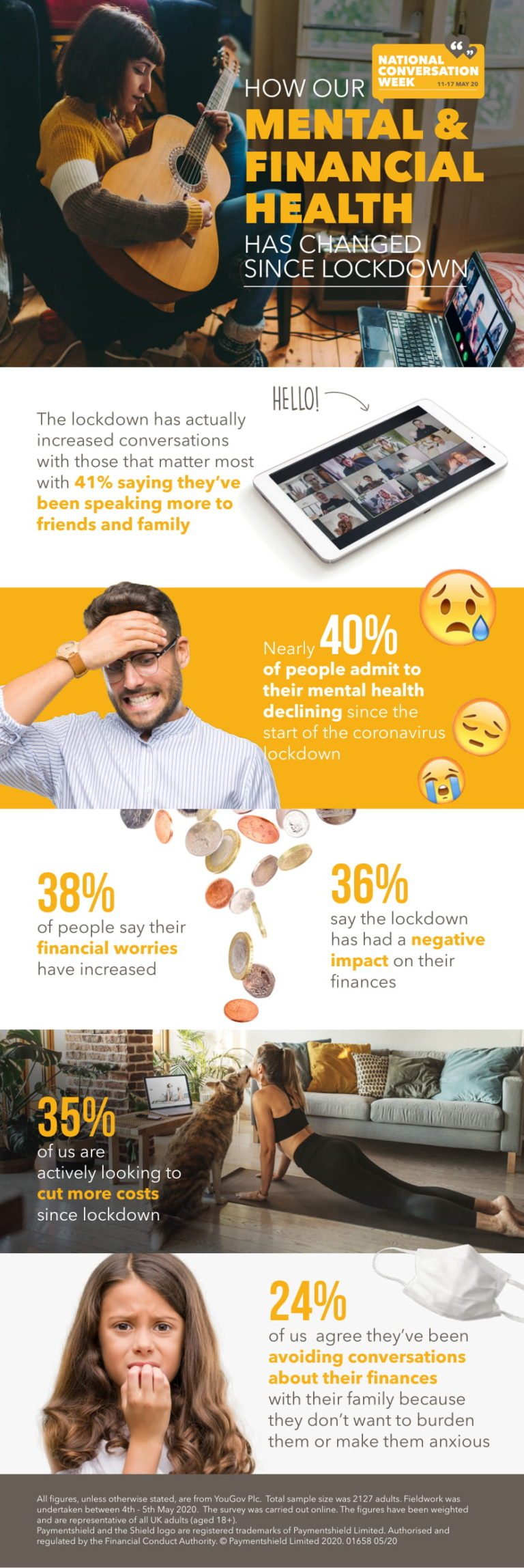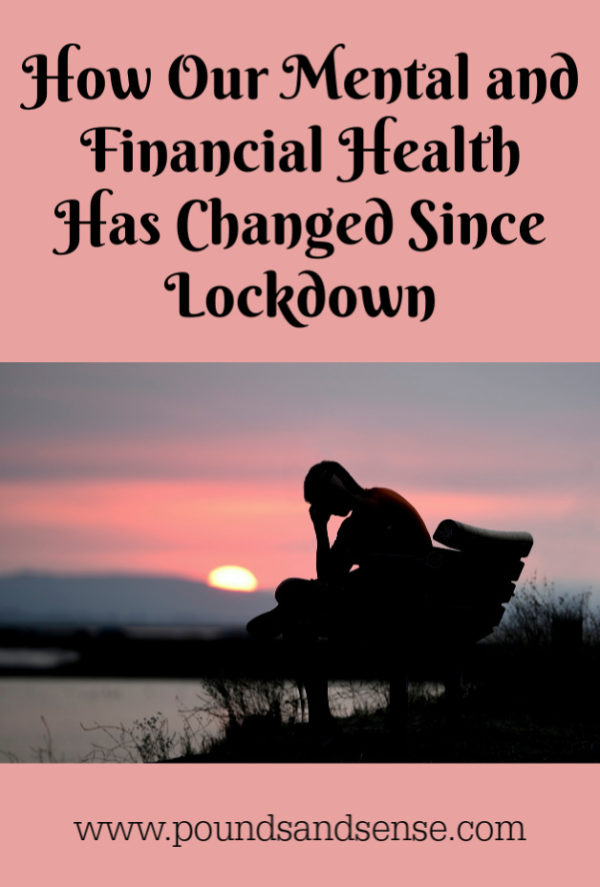How Our Mental and Financial Health Has Changed Since Lockdown (Infographic)
Today I have an eye-opening infographic for you from my friends at National Conversation Week, which I mentioned a few days ago in this post.
The infographic is based on a YouGov survey commissioned by Paymentshield as part of National Conversation Week, which this year runs from 11-18 May.
Among other things, the survey revealed that money is currently the third-biggest concern for the public, following fears for friends and family, and health worries. More than a third of respondents (39%) also reported a decline in their mental health since March 2020. Thirty-eight per cent of people said their financial worries had increased during the coronavirus outbreak.

About National Conversation Week
National Conversation Week aims to get people talking in a bid to improve the nation’s well-being, at a time when people are facing unprecedented challenges and are separated from each other. In particular, this year’s awareness week encourages conversations about money, to tackle increasing financial worries among consumers.
Financial organisation Paymentshield has teamed up with independent financial research company Defaqto and mental health charity Mind to emphasise the importance of financial conversations, and the close relationship between financial and mental well-being.
Financial worries have a huge impact on mental health, and talking to someone about the situation can be very helpful. However, the survey found that nearly a quarter of people (24%) are avoiding talking about finances with friends and family, for fear of burdening them or making them anxious.
As well as the effect on mental health, coronavirus is affecting consumer behaviour. Thirty-six per cent of people say that coronavirus has already had a negative impact on their personal finances, with 35% increasingly trying to cut costs during lockdown.
During periods of financial uncertainty, people tend to consider their outgoings and can be tempted to make risky financial decisions based purely on cost alone. Despite the increase in money worries and a drive to cut costs, 92% of people had not spoken to a professional financial adviser. Doing so could help alleviate concerns and provide greater understanding of each individual’s situation for peace of mind.
Jennifer Ripley, Head of Marketing at Paymentshield, said:
“The current situation has affected everyone in different ways. People are facing a variety of challenges, from health worries to loneliness, and concerns about loved ones on top of financial difficulty and uncertainty. National Conversation Week aims to encourage safe, socially-distant talking as a way of alleviating some of those worries. In particular, we want to raise awareness that a simple chat about money can help, especially when it comes to making risky financial decisions. This week, we urge everyone that is worried about finances to talk to a professional financial adviser.
“Our research found that 41% of people are actually talking to friends and family more during the lockdown, through messages, video calls, and phone calls. We’re calling on the nation to keep the conversations going, so people can help to cheer each other up and take care of each other during these tough times.”
The annual awareness week, founded by Paymentshield, is now in its fourth year. For more information, resources and advice, or ways to get involved, visit: http://www.nationalconversationweek.co.uk
My Thoughts
Thank you to my friends at National Conversation Week for the information above and the infographic. There are some pretty shocking stats in this, including the fact that nearly 40% of people admit to their mental health declining since the start of the pandemic.
So it really is essential to reach out for support if you need it right now, whether for financial, mental health or other reasons. Speak to friends and family members, and to financial experts if appropriate (here’s a link to my blog post about why I have a personal financial adviser). There is also some great advice about looking after your mental health during the pandemic at www.mind.org.uk/coronavirus.
Above all, though, be kind to yourself, and don’t suffer in silence. And equally, if you know someone who may be struggling – or you just haven’t seen or heard from them for a while – reach out by phone or at least message them to check they are okay. It may be a bit of a cliche, but we really are all in this together. And pretty much everyone is struggling in their own way.
- If you are working from home right now, by choice or due to the virus, you may also enjoy this excellent piece by my fellow blogger Actual Ar about Keeping on Top of Your Well-being as a Remote Worker.
As always, if you have any comments or questions about this post and/or National Conversation Week, please do leave them below.


May 15, 2020 @ 9:59 am
92% hadn’t spoken to a financial advisor.. I wonder if they knew more about how they work, the costs, etc, whether they’d feel a little more confident about their financial situation? It’s definitely an option to consider.
Great post, Nick. The mental health impact of this situation, not to mention the financial concerns and uncertainty, shouldn’t be underestimated.
Caz xx
May 15, 2020 @ 1:37 pm
Thanks, Caz. I am definitely all in favour of speaking to a financial adviser, even if you think yourself reasonably knowledgeable on financial matters. Even though I’m a money blogger, I am not ashamed to admit that I have one myself.
May 16, 2020 @ 9:39 am
I for one have definitely been cutting down on spend; for example I have cancelled my flower subscription deliveries as I dont think I can justify the spend right now, and have cancelled an account with a tool for work which I’m simply not using at the moment.
May 16, 2020 @ 10:05 am
Thanks, Micaela. Yes, I’ve cut back as well, including cancelling a couple of magazine subscriptions. In these uncertain times it clearly makes sense to reduce unnecessary spending.
May 16, 2020 @ 3:40 pm
I’ve cut down on spending because I’ve not really left the house but when I’ve done the food shop I’ve noticed an increase in that cost, it is now £30-£40 more than it used to be. So this is an area I need to look at, changing brands I use etc…
May 16, 2020 @ 3:45 pm
Thanks, Rachel. Yes, I’ve also been spending less on leisure activities and travel, but more on food shopping. My cooking skills have improved, though!